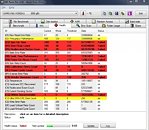Friday, February 4th 2011

Spot Signs of SATA Performance Degradation on Cougar Point P67/H67 Chipsets
Apparently there's a "slim" chance of users actually being affected by the recently-discovered chipset design error plaguing Intel's Cougar Point 6-series chipsets that drive the SandyBridge processors. Intel pegs this at 5% performance degradation caused due to data transfer errors over a period of 3 years. Users of Romanian tech community Lab 501 found out a way of detecting if your hard drives connected to the damage-prone SATA ports are already showing signs of errors.
To do so, you need the HD Tune Pro software, you can try out the Pro version. Select a hard drive connected to the damage-prone SATA 3 Gb/s port, click on the "Health" tab. HD Tune checks out various self-diagnostic parameters of the drive, including SMART values. A drive connected to an affected port should fail a number of tests as shown in the screenshot below. As a stopgap solution, you can connect the drive to one of the SATA 6 Gb/s ports available. Most motherboards should have 2 internal 6 Gb/s ports, some have additional 6 Gb/s ports driven by 3rd party controllers. It's advisable to use ports of those controllers. This stopgap fix should pull you through till April-May, when motherboard vendors are expected to have motherboards with B3 revision of the Cougar Point chipset. You can then claim replacement of your board under warranty.
Source:
Lab 501
To do so, you need the HD Tune Pro software, you can try out the Pro version. Select a hard drive connected to the damage-prone SATA 3 Gb/s port, click on the "Health" tab. HD Tune checks out various self-diagnostic parameters of the drive, including SMART values. A drive connected to an affected port should fail a number of tests as shown in the screenshot below. As a stopgap solution, you can connect the drive to one of the SATA 6 Gb/s ports available. Most motherboards should have 2 internal 6 Gb/s ports, some have additional 6 Gb/s ports driven by 3rd party controllers. It's advisable to use ports of those controllers. This stopgap fix should pull you through till April-May, when motherboard vendors are expected to have motherboards with B3 revision of the Cougar Point chipset. You can then claim replacement of your board under warranty.

22 Comments on Spot Signs of SATA Performance Degradation on Cougar Point P67/H67 Chipsets
In screenshot I see faulty drive and errors caused by chipset. It looks to me that it's affecting HDD's contrary to what Intel said, or HDD used for test is bad.
This screen simply shows unreliable data transfer, which results in scrambled and stupid SMART data => sign of the errors in data transfers.
time and more user feedback will tell
PS. I posted pictures from the topic there, but too see them u need to browse the forum, and not the direct topic in the site
I have a user on another forum. This is how it looks in HDTune
And how it looks in CDI or another SMART reading software.
So I'd take HDTune results with a grain of salt.
Also I wouldn't trust them so much. I've read them in the past and they did some n00b-ish mistakes and this might be just one of those mistakes.
These tests on the 6 Gb/s port -
Followed by these on the 3 Gb/s port -
Suggest you take a look at the OCZ forum:
www.ocztechnologyforum.com/forum/forumdisplay.php?248-Sandforce-Vertex2-LE-Pro-Agility2-Vertex2-Agility2-EX-Drives-REVO-and-HSDL-drives
If you actually want to check the Chipset, Gigabyte has a vendor neutral solution for it.
edit- Oh man... completely disregard this as a solution. Instead consider it free LOL's at Gigabyte for their... solution.
It checks what ports are being used, and flags thet SATA-2 ones... for being in use. lol
what'll be funny is if you use it and it just claims that all sata II ports are faulty, even on external sata controllers.
It loads 35mb/sec 24/7.